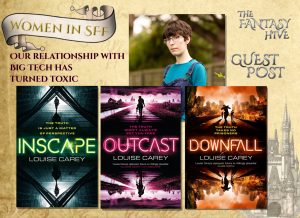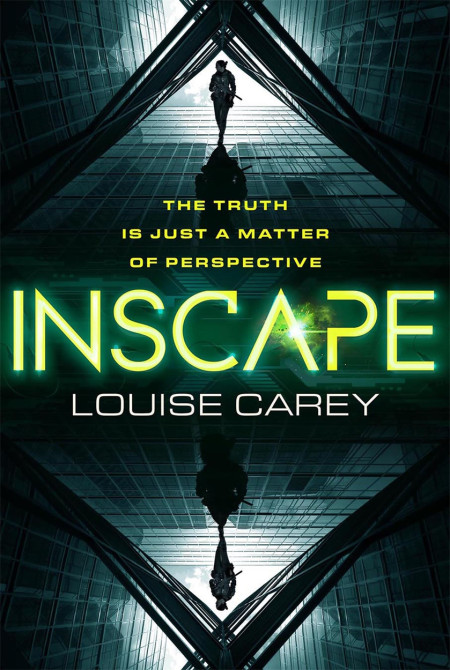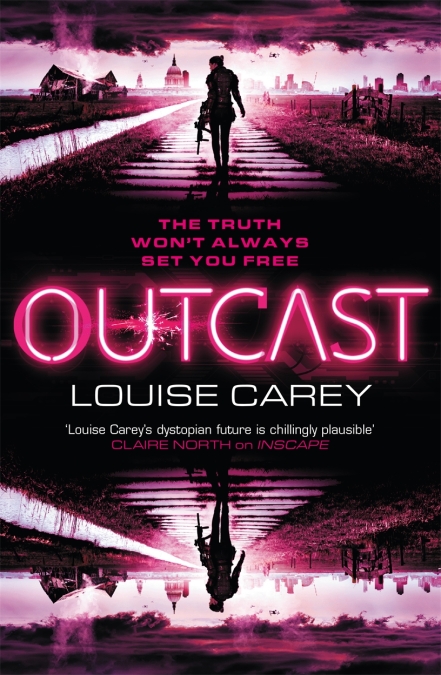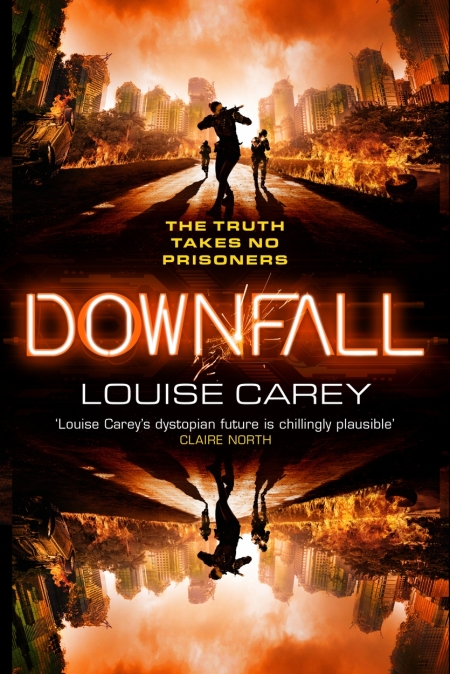Our relationship with Big Tech has turned toxic – GUEST POST by Louise Carey
Our relationship with Big Tech has turned toxic
And it’s not us…
By Louise Carey
There’s a growing sense swirling around the zeitgeist that our collective relationship with social media and related technology has become deeply dysfunctional. It sometimes seems there’s no social ill that it doesn’t make worse: inscrutable algorithms on YouTube leading people down rabbit holes of conspiracy and white supremacy, 24-hour news cycles and infinite scrolling shattering our already fragmented attention spans, Instagram promoting unrealistic and damaging beauty standards. Anxieties have reached a point where the US Surgeon General recently sounded the alarm over the effect of social media usage on children’s wellbeing, blaming it in part for a ‘youth mental health crisis’.
These concerns are reflected in the mounting number of self-help books, op-eds and buzzy listicles around weaning ourselves off our smartphone dependency. In these, we’re encouraged to break up with our phones, quit social media (sometimes cold turkey), and embark on digital detoxes. This language frames the digital content we consume interchangeably as an addiction, a poison, or a terrible relationship that we must end for our own sanity.
The empirical evidence for these fears is mixed at best, but in a way, that’s part of the worry. We still know very little about the long-term effects of digital habits that have become deeply ingrained in our day-to-day lives. The algorithms that curate our newsfeeds and recommendations are opaque by design, their mechanisms closely guarded proprietary secrets. They may be personalised for us, but that doesn’t mean they’re good for us – or that we control them. In fact, much of the anxiety around social media stems from the fear that it’s the other way around.
A 2016 experiment found that teenage girls who were shown retouched and filtered Instagram selfies reported greater dissatisfaction with their own body image than those shown unedited photographs, while simultaneously rating the airbrushed photos as more attractive than their original counterparts. What’s striking about this finding for me is that it highlights a broader paradox: we are drawn in by the easy, compulsive allure of endless social media content like moths to a flame, but it often ends up making us feel worse, not better.
On an anecdotal level, I’m sure we’ve all been caught at one time or another in a doomscrolling loop, endlessly refreshing a newsfeed long past the point where the activity has ceased to be satisfying or even entertaining. During the lockdowns in particular, I had conversations with friends about how we’d sometimes catch ourselves doing this past the point of boredom and into actual distress, bingeing on empty-calory soundbites that made us feel worse about the world and ourselves. We knew it wasn’t doing us any good, but we couldn’t stop ourselves from going back, time and time again.
To refer back to the metaphors at the start of this post, if social media is a drug, it’s a hard habit to kick. And if it’s a partner, it’s an emotionally manipulative one, one who plays on our feelings to keep us coming back for more, long after the spark is dead and we’re starting to wonder why we haven’t called time on the whole thing.
I find the latter a particularly useful way of thinking about all of this, because relationships are at the heart of the problem here. Never mind who we’re following or messaging: when we engage with the algorithms behind Facebook, Instagram, Google, or similar sites, the overarching relationship we’re entering into is one with the tech giants themselves. And tech giants, like most big corporations, do not have our best interests at heart.
I’m a big proponent of the theory that corporations function a lot like psychopaths. They exist to make profit for their shareholders and to expand themselves, and their organs of accountability and management are set up to meet those aims. They don’t have functioning consciences. It’s not a coincidence that so many large corporations have, at one time or another, prioritised their own reputation or profit margins over human health, safety or wellbeing. History is littered with examples: Boeing’s attempts to conceal the fatal design flaws in the 737 Max, or Nestlé and other baby milk companies’ infamous practice of hawking powdered milk to communities without access to the facilities or water supply to use it safely. These aren’t isolated or aberrant incidents, they’re particularly unpalatable examples of the wider corporate system functioning pretty much as usual.
In fact, even the psychopath characterisation applies an unhelpfully anthropomorphic gloss to the way corporations operate. It’s tempting to dismiss many big businesses as evil, but I think this is missing the point. Corporate entities can’t be evil any more than they can be good, because they aren’t human. If anything, they’re more like hive minds. They may be made up of people, but they function collectively as something else, something alien, with emergent properties that are only obliquely related to human value systems and codes of ethics. And that’s kind of terrifying.
Looked at this way, is it any wonder our relationship with social media is so dysfunctional? The problem doesn’t lie with us so much as with the algorithms that dictate the terms of our engagement – algorithms that were not set up to educate, inform or even entertain us, but rather to keep us engaged, tapping and clicking and raking in advertising revenue, for as long as possible.
Personally, I think it’s incredibly telling that many tech moguls ban or severely limit their own children’s use of the platforms they helped to create and popularise. As the saying goes, these services are free because we are the product – and that’s a vulnerable and disempowering position to be in.
The asymmetrical, coercive relationship we have with the technology giants that shape so many aspects of our lives was very much in my mind when I was writing the Inscape trilogy (which will conclude with the release of Downfall on the 20th of July). One of the questions that inspired me to start the trilogy was, what if we really were in a relationship with big tech? What if big tech raised us, nurtured us, and tried to make us in its image? Tanta, my protagonist, is a corporate orphan – taken in by a technology conglomerate shortly after birth. Like us, she’s a product. She’s been raised to be the perfect corporate spy – unquestioningly loyal, unflinchingly obedient, and unhesitatingly willing to do her corporation’s dirty work.
Reviewers have framed Inscape, Outcast and Downfall as glimpses into a dystopian future, but like many dystopian writers, what I was really interested in was our tech-dependent present. I wanted to see how the inhuman, inscrutable logic of an algorithm might go about raising a child. What might that cold and transactional relationship look like, not on a social media feed, but in a home? What if you were raised by the algorithm? What would it do to you? And how far would you go to prove your love to an entity that was psychologically incapable of ever loving you back?
Louise Carey is a fantasy and science-fiction author. Her debut cyberpunk trilogy, Inscape, Outcast and Downfall, is available now from Gollancz. Inscape was nominated for an SCK Award and has been described as ‘A propulsive thriller… with great twists and reversals’ (4 stars – SFX).
She has also co-written two fantasy novels, The City of Silk and Steel and The House of War and Witness (Gollancz), as well as a graphic novel, Confessions of a Blabbermouth (DC Comics).
When she’s not writing, Louise can usually be found playing board games, reading horror, or DMing for a group of rowdy but well-intentioned adventurers.
She’s repped by Meg Davis of Ki Agency.
Twitter: @LouiseCarey25 | Website: www.louise-carey.co.uk
Sources
US Surgeon General on social media risk to young people: https://www.hhs.gov/about/news/2023/05/23/surgeon-general-issues-new-advisory-about-effects-social-media-use-has-youth-mental-health.html
Effect of manipulated Instagram photos on body image: https://www.tandfonline.com/doi/full/10.1080/15213269.2016.1257392
Boeing 737 Max scandal: https://www.theguardian.com/business/2022/sep/22/boeing-settlement-737-max-crashes
Baby milk scandal: https://waronwant.org/resources/baby-killer
Tech moguls banning their children from social media: https://www.independent.ie/life/family/parenting/the-tech-moguls-who-invented-social-media-have-banned-their-children-from-it/37494367.html




